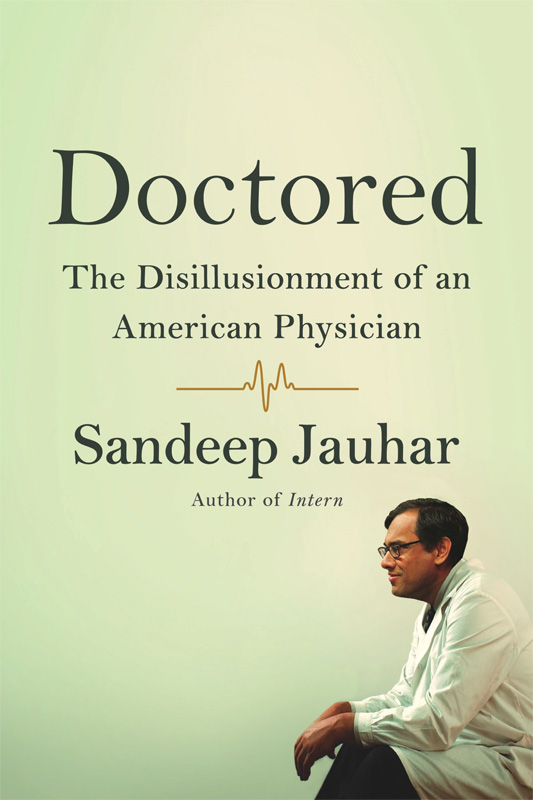
Doctored--The Disillusionment of an American Physician
کتاب های مرتبط
- اطلاعات
- نقد و بررسی
- دیدگاه کاربران
نقد و بررسی

July 1, 2014
The further education of a doctor.Cardiologist Jauhar (Intern: A Doctor's Initiation, 2007) was nearing middle age and finding himself ever more impatient, indifferent, dismissive and paternalistic-everything he had abhorred in his idealistic youth-and his sense of integrity gnawed at him, as did the demands of his job. What will come as a surprise to many readers is that doctors, too, worry about their incomes, which aren't close to Midas' pocket change. Granted, it's far more than many of us earn, but for many doctors, moonlighting helps pay the insurance coverage. When Jauhar had embarked on his medical school training, he had visions of entitlement dancing in his head-"They made more money and earned more respect than just about any other profession"; "Doctors largely set their own hours and determined their own fees"-but that was then; now he finds himself an overworked, underpaid cardiologist at a Long Island hospital. Although income issues come to dominate the book, Jauhar shows flashes of warmth and connection-"At one time, keen observation and the judicious laying on of hands were virtually the only diagnostic tools a doctor had. Today they seem almost obsolete"-and he writes with a nitty-gritty appreciation for hard work as he wrestles with moral quandaries and struggles to keep everything-home and work-intact. At times, the author seems to be arguing with the devil on his shoulder-shady big pharma money, collegial back-scratching, pure fraud in the ordering of excessive testing-as he strives to meet his quota of "Relative Value Units"-i.e., the values insurers place on medical services.A medical story about the loss of ideals and the corrections to course one makes as midlife and its responsibilities arrive, with insights into the overly complicated and often fraudulent state of health care today.
COPYRIGHT(2014) Kirkus Reviews, ALL RIGHTS RESERVED.

March 1, 2014
Not just a memoir of Jauhar's work as director of the Heart Failure Program at a Long Island, NY, hospital, this critique does for our health-care system what the author's best-selling eye-opener, Intern, did for the hospital residency: it gives us an insider's view of some harsh and enduring realities that cry out for reform. Jauhar focuses on the cronyism, needless tests, and treatment of one patient by multiple specialists, leading to big bills and a fractured health-care picture, all part of the push to cover costs and stave off malpractice suits. Important reading as we debate health care.
Copyright 2014 Library Journal, LLC Used with permission.

Starred review from June 15, 2014
A follow-up to Intern: A Doctor's Initiation, medical doctor and New York Times contributor Jauhar's latest is part memoir and part denunciation of America's current health-care system. Reflecting on his career at midlife, Jauhar is surprised at the physician he has grown into: disaffected and disillusioned, with a sense of loss of core ideals and enthusiasm for his work. And he isn't alone; he argues that there is a collective ambivalence within the medical community. Supporting his perspective, much of the book is composed of anecdotes of encounters he experienced during his career as a cardiologist. Citing instances related to malpractice insurance precautions, for-profit research companies, and hospital bottom lines, the author concludes that these factors have contributed to the overall bureaucratic and emotionless modern health-care environment. He argues that ultimately it is the American health-care landscape that is contributing to the ineffectiveness of the current state of patient care and that physicians have to sacrifice the intimacy of patient interactions to satisfy economic interests. VERDICT Written in a narrative, reflective style, this is a compelling depiction of the current state of health care and elicits a call to action by health professionals. Recommended for consumer-health enthusiasts, health-care workers, and medical-treatment policymakers.--Carolann Curry, Mercer Univ. Lib., Macon, GA
Copyright 2014 Library Journal, LLC Used with permission.

June 15, 2014
A follow-up to Intern: A Doctor's Initiation, medical doctor and New York Times contributor Jauhar's latest is part memoir and part denunciation of America's current health-care system. Reflecting on his career at midlife, Jauhar is surprised at the physician he has grown into: disaffected and disillusioned, with a sense of loss of core ideals and enthusiasm for his work. And he isn't alone; he argues that there is a collective ambivalence within the medical community. Supporting his perspective, much of the book is composed of anecdotes of encounters he experienced during his career as a cardiologist. Citing instances related to malpractice insurance precautions, for-profit research companies, and hospital bottom lines, the author concludes that these factors have contributed to the overall bureaucratic and emotionless modern health-care environment. He argues that ultimately it is the American health-care landscape that is contributing to the ineffectiveness of the current state of patient care and that physicians have to sacrifice the intimacy of patient interactions to satisfy economic interests. VERDICT Written in a narrative, reflective style, this is a compelling depiction of the current state of health care and elicits a call to action by health professionals. Recommended for consumer-health enthusiasts, health-care workers, and medical-treatment policymakers.--Carolann Curry, Mercer Univ. Lib., Macon, GA
Copyright 2014 Library Journal, LLC Used with permission.

























دیدگاه کاربران